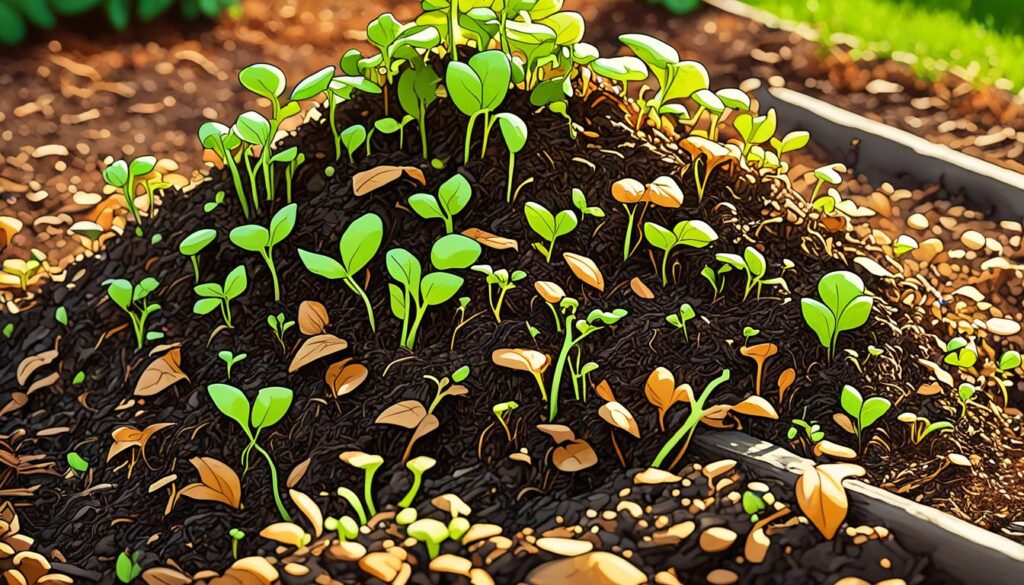Is your garden struggling to reach its full potential? Are your plants not thriving as you’d hoped? The key to unlocking their true potential may lie beneath the surface – in your soil.
Soil is the foundation of a healthy garden, providing the necessary nutrients and support for your plants to grow and flourish. But how can you ensure that your soil is well-fed and capable of sustaining optimal plant growth?
In this article, we will explore the art of feeding your soil effectively. From understanding the importance of testing your soil to discovering the wonders of organic matter, we will equip you with the knowledge and techniques you need to create a thriving garden. It’s time to transform your soil and elevate your gardening game.
Are you ready to unlock the secrets of healthy soil? Let’s dive in!
Key Takeaways:
- Testing your soil is crucial for understanding its specific needs and making appropriate amendments.
- Organic matter, such as compost, is essential for nourishing the soil and promoting healthy plant growth.
- Protecting and improving soil through practices like mulching, crop rotation, and utilizing cover crops is vital for long-term soil health.
- Feeding your soil effectively is the foundation for creating an optimal environment for your plants to thrive.
- Caring for your soil is essential for the long-term health and productivity of your garden.
Test Your Soil
Testing your soil is the crucial first step in effectively nourishing it and ensuring optimal plant growth. By analyzing your soil, you can gain valuable insights into its texture, pH level, and nutrient content. This information will help you understand the specific needs of your plants and guide you in making the appropriate amendments to provide them with the best possible environment.
To test your soil, there are two main options available: using soil testing kits or submitting a sample to a professional lab. Soil testing kits are convenient and easy to use, providing you with quick results that you can interpret and act upon. On the other hand, submitting a sample to a professional lab offers more detailed analysis and recommendations based on your soil’s specific characteristics.
Regular soil testing is essential to ensure that you are providing the right nutrients for your garden. It helps you track changes in soil quality over time and make any necessary adjustments. By testing your soil at the start of each planting season or when you notice changes in your plants’ health, you can stay proactive and address any deficiencies or imbalances.
Remember to pay attention to the specific testing requirements for different plants and crops. Certain plants may have unique pH or nutrient preferences, and tailoring your soil amendments accordingly will optimize their growth and performance.
The Benefits of Soil Testing:
- Identify pH levels: Acidic or alkaline soil can influence nutrient availability to plants. By knowing the pH level of your soil, you can adjust it if necessary to create the optimal growing conditions.
- Determine nutrient deficiencies: Soil testing allows you to identify any nutrient deficiencies or excesses in your soil, helping you supplement the necessary elements for healthy plant growth.
- Understand soil texture: Different plants thrive in different soil textures. Knowing the texture of your soil can help you select suitable plants and make informed decisions about soil amendments.
By regularly testing your soil and addressing any issues it may have, you can cultivate a thriving garden with lush, vibrant plants that produce abundant blooms and delicious, nutritious fruits and vegetables.
| Soil Test Parameters | Ideal Range | Action Steps |
|---|---|---|
| pH Level | Varies depending on plant preferences | For acidic soil: add lime or wood ash For alkaline soil: add elemental sulfur or peat moss |
| Nitrogen (N) | Varies depending on plant preferences | Add organic matter such as compost or use nitrogen-rich fertilizers |
| Phosphorus (P) | Varies depending on plant preferences | Add phosphorus-rich fertilizers or organic amendments like bone meal |
| Potassium (K) | Varies depending on plant preferences | Use potassium-rich fertilizers or organic amendments like wood ash |
| Organic Matter | 5% or above | Add compost, leaf mold, or other organic materials to increase organic matter content |
| Other Nutrients (e.g., calcium, magnesium) | Varies depending on plant preferences | Use appropriate fertilizers or organic amendments |
Adding Organic Matter
Organic matter plays a crucial role in nurturing soil and supporting the growth of healthy plants. It not only enhances soil structure but also improves moisture retention and supplies essential nutrients. There are various sources of organic matter that can be added to your garden soil to enrich it and foster optimal plant growth.
The Power of Compost
One of the best ways to add organic matter to your soil is through compost. Compost is created by decomposing plant and animal materials, resulting in a nutrient-rich mixture that can greatly benefit your garden. When you incorporate compost into your soil, you introduce a wealth of nutrients that plants need for their growth and development.

Compost also enhances soil drainage, allowing water to penetrate more effectively and preventing waterlogging. This promotes a healthy root system and reduces the risk of fungal diseases caused by excessive moisture. Additionally, compost aids in improving soil structure by loosening compacted soil, providing a favorable environment for plant roots to grow.
Other Sources of Organic Matter
Aside from compost, there are other sources of organic matter that can be incorporated into your soil to boost its fertility. Shredded leaves, grass clippings, and animal manure are fantastic options. Shredded leaves not only add valuable nutrients to the soil but also enhance its ability to retain moisture. Grass clippings are rich in nitrogen, which is an essential element for plant growth. Animal manure, such as cow or chicken manure, provides a wide range of nutrients that are beneficial for plant development.
Adding organic matter to your soil is like giving it a wholesome meal. It nourishes the soil, supporting the growth of strong and healthy plants.
When incorporating organic matter into your soil, aim for a well-balanced blend that provides a variety of nutrients. The combination of different materials ensures that your plants receive a diverse array of essential elements for their overall health and vigor.
Remember, organic matter is the key to creating nutrient-rich soil and promoting optimal plant growth. By adding compost and other organic materials, you can enhance soil structure, improve moisture retention, and supply vital nutrients to your plants.
CLICK HERE TO CHECK OUR RECOMMENDED PRODUCTSProtecting and Improving Soil
To ensure the long-term health of your soil, it is important to take steps to protect it from erosion, compaction, and nutrient depletion. By implementing certain practices and using appropriate techniques, you can maintain the quality and fertility of your garden soil. Here are some key strategies to consider:
Mulching:
Mulching the soil surface with wood chips or organic materials is a highly effective way to protect your soil. By spreading a layer of mulch around your plants, you create a barrier that helps retain moisture, moderate soil temperature, and suppress weed growth. A mulch layer also prevents soil erosion caused by heavy rainfall, ensuring that valuable nutrients stay in place. Plus, mulching adds organic matter to the soil as it breaks down, enhancing its overall fertility.
Avoiding Soil Compaction:
Soil compaction occurs when the soil particles become tightly packed, reducing its capacity to hold air and water. This can hinder root growth and nutrient uptake by plants. To avoid soil compaction, limit foot traffic on soil beds and use designated paths for walking. Avoid working on wet soil, as it is more prone to compaction. Additionally, you can use raised beds or containers to create a well-drained environment where the soil is less likely to become compacted.
Crop Rotation:
Crop rotation is a practice where different crops are grown in a specific sequence throughout the seasons. This technique helps break pest and disease cycles, preventing the buildup of harmful organisms in the soil. By rotating crops, you can disrupt the life cycles of pests and diseases that target specific plants, reducing the need for chemical interventions. Additionally, different crops have different nutrient requirements, so crop rotation helps maintain a balanced nutrient profile in the soil.
Cover Crops:
Planting cover crops, also known as green manure, is another effective way to protect and improve your soil. Cover crops are typically planted during fall or winter to provide ground cover and protect the soil from erosion. They also help suppress weeds, add organic matter, and improve soil structure. Examples of cover crops include clover, rye, and vetch. When cover crops are turned into the soil, they naturally release nutrients, enriching the soil for future plantings.
Soil Amendments:
Adding soil amendments can help maintain a balanced pH level and supply essential nutrients to your soil. Examples of soil amendments include aged animal manure, compost, and lime. These amendments not only provide additional nutrients but also improve soil structure and enhance microbial activity. By regularly applying soil amendments, you can create an optimal environment for plant growth and ensure the long-term fertility of your soil.
By implementing these strategies, you can protect your soil from erosion, compaction, and nutrient depletion, and ensure a healthy and productive garden. Remember, healthy soil is the foundation for successful gardening, providing the nutrients and support that your plants need to thrive.

Conclusion
Creating healthy soil is the key to unlocking the full potential of your garden. By implementing the tips discussed in this article, you can nourish your soil and provide an optimal environment for your plants to thrive. Testing your soil regularly allows you to understand its specific needs and make informed decisions about nutrient amendments. Adding organic matter, such as compost, enriches the soil with essential nutrients and improves its structure for optimal plant growth.
Protecting your soil from erosion and compaction is crucial. Mulching the soil surface with wood chips or organic materials retains moisture and suppresses weed growth, while limiting foot traffic helps maintain proper soil structure. Implementing crop rotation practices and cover crops prevent the buildup of pests and diseases, improving soil fertility over time.
Remember, healthy and nutrient-rich soil is the foundation for optimal plant growth. By taking care of your soil, you are investing in the long-term health and productivity of your garden. So, start nourishing your soil today and reap the rewards of a bountiful and thriving garden for years to come.
FAQ
Why is it important to test your soil?
Testing your soil helps you understand its specific needs in terms of pH level, nutrient content, and texture, allowing you to make appropriate amendments and provide the right nutrients for your plants.
What is the best source of organic matter for soil?
Compost, which is made from decomposed plant and animal materials, is one of the best sources of organic matter. It enriches the soil with nutrients, improves drainage, and enhances microbial activity.
How can I protect my soil from erosion and compaction?
Mulching the soil surface with wood chips or organic materials helps retain moisture, moderate soil temperature, and suppress weed growth. Limiting foot traffic and using designated paths can also prevent soil compaction, allowing air and water to penetrate the soil.
How can crop rotation and cover crops improve my soil?
Implementing crop rotation practices and utilizing cover crops help prevent the buildup of pests and diseases and improve soil fertility. They also contribute organic matter to the soil, enhancing its nutrient content and overall health.
What are soil amendments and how do they improve soil?
Soil amendments, such as aged animal manure or lime, help maintain a balanced pH level and supply essential nutrients. They can improve soil fertility and ensure that your soil remains healthy and nutrient-rich.
Why is healthy soil important for a successful garden?
Healthy soil serves as the foundation for optimal plant growth. By nourishing your soil effectively, you can create an optimal environment for your plants to thrive, leading to a bountiful garden harvest.
